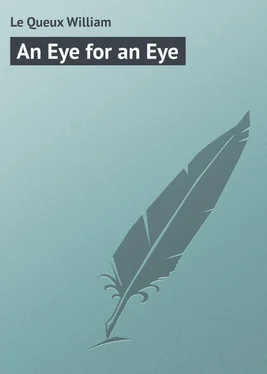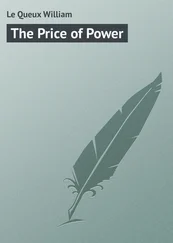William Le Queux - An Eye for an Eye
Здесь есть возможность читать онлайн «William Le Queux - An Eye for an Eye» — ознакомительный отрывок электронной книги совершенно бесплатно, а после прочтения отрывка купить полную версию. В некоторых случаях можно слушать аудио, скачать через торрент в формате fb2 и присутствует краткое содержание. Жанр: foreign_prose, на английском языке. Описание произведения, (предисловие) а так же отзывы посетителей доступны на портале библиотеки ЛибКат.
- Название:An Eye for an Eye
- Автор:
- Жанр:
- Год:неизвестен
- ISBN:нет данных
- Рейтинг книги:3 / 5. Голосов: 1
-
Избранное:Добавить в избранное
- Отзывы:
-
Ваша оценка:
- 60
- 1
- 2
- 3
- 4
- 5
An Eye for an Eye: краткое содержание, описание и аннотация
Предлагаем к чтению аннотацию, описание, краткое содержание или предисловие (зависит от того, что написал сам автор книги «An Eye for an Eye»). Если вы не нашли необходимую информацию о книге — напишите в комментариях, мы постараемся отыскать её.
An Eye for an Eye — читать онлайн ознакомительный отрывок
Ниже представлен текст книги, разбитый по страницам. Система сохранения места последней прочитанной страницы, позволяет с удобством читать онлайн бесплатно книгу «An Eye for an Eye», без необходимости каждый раз заново искать на чём Вы остановились. Поставьте закладку, и сможете в любой момент перейти на страницу, на которой закончили чтение.
Интервал:
Закладка:
“The woman is decidedly good-looking, isn’t she?” observed Cleugh as we entered.
Instinctively I turned towards the chair in which the body was still reclining, but next instant, with a loud cry of dismay, which at the same moment was echoed by Patterson, I stood aghast, rigid, immovable.
The sight which met our eyes was utterly bewildering.
The woman we had discovered there, so lovely in form and feature, had a wealth of auburn hair, and eyes of a deep intense blue, while, amazing though it was, this woman before us was quite ten years older, dark-complexioned, with hair which in that light seemed blue-black, and half-closed eyes as dark as jet.
“Good Heavens!” I gasped. “Look! Why, that is not the woman we found when we first entered this place – but another. Where is the fair girl?”
“There’s no fair girl,” answered the detective Boyd, as all started back in surprise at my astounding assertion. “This is the woman we found, you must be mistaken.”
“No,” Patterson declared in the low, hoarse voice of one filled with fear. “There is no mistake. When we first entered there was another woman here, younger, prettier, with light hair and blue eyes. This is the most unaccountable, most amazing and most inexplicable of all our discoveries.”
Chapter Five
The Second Woman
The statement that the woman found by Patterson on his first entry there, and seen by me afterwards, had disappeared, was at first discredited by our companions. It seemed too astounding to be the truth, nevertheless there was now reclining in the same armchair a woman who certainly bore no resemblance whatever to the beautiful, fair-haired girl with eyes of such deep, pure blue – those eyes that had stared at me so horribly in the ghastly rigidity of death. I recollected that smile upon her lips, half of sarcasm, half of pleasure; that strange expression which had held me entranced yet horrified.
She had disappeared, and here in her place was a dark-complexioned woman, older, nevertheless handsome – a woman in whose refined face was an air of romance and tragedy, and upon whose hand was the marriage bond. She, too, was dead. The doctor had examined her and pronounced life extinct.
“How could this have occurred?” I exclaimed, turning to Patterson as soon as I had recovered from the shock of the astounding discovery.
“It’s simply amazing!” he declared. “I’m utterly at a loss to account for it. The woman we found here was most distinctly another person.”
“Then there has been a triple tragedy,” observed Boyd. “The body of the first woman must have been conveyed away during the time you were absent at the police-station.”
“But why?” I asked. “What on earth could be the motive?”
“Impossible to tell,” Patterson answered. “Perhaps the body is hidden somewhere in the house.”
“No,” Boyd replied. “We’ve made a complete search everywhere. It has undoubtedly been taken away. This fact, in itself, shows first, that there is more than one person implicated in the crime, and secondly, that they were absolutely fearless; while further, the incident of the telephone is in itself sufficient proof that they had taken the utmost precautions against detection.”
“Are you quite certain that every cupboard and wardrobe has been looked into?” I asked doubtfully.
“Quite. From garret to cellar we’ve thoroughly overhauled the place. There are a couple of large trunks in one of the bedrooms, but we examined the contents of both. They contain books.”
“But loose boards, or places of that sort?” I suggested.
“When we search a place,” responded the Scotland Yard inspector with a smile, “we’re always on the look-out for places of concealment. I’ve superintended the investigation myself, and I vouch that nothing is concealed within this house.”
“Do you think that the assassin was actually in the house when we first entered?”
“That’s more than likely,” he answered with a pensive air. “Evidently the instant you’d gone the body of the fair-haired girl was somehow spirited away.”
“Where?”
“Ah, that’s what we must find out. Perhaps a taxi-driver will be able to throw a light upon the matter.”
“This is certainly a first-class mystery,” observed Dick, with journalistic instinct and a keen eye to those “special interviews” and “latest revelations” in which readers of his journal always revelled. “It will make no end of a stir. What a godsend, now that the gooseberry season is coming on.”
A good murder mystery is always welcome to a certain class of London daily journals, but more especially in the season when Parliament is “up,” the Courts are closed for the Vacation, and the well of sensations runs low. This season is termed, in journalistic parlance, “the gooseberry season,” on account of the annual appearance of the big gooseberry, that mythical monster of our youth, the sea-serpent, and the starting of the usual silly correspondence upon “Why should we live?” or some equally interesting controversial subject.
We were all held in blank astonishment at this latest development of the extraordinary affair. It had so many remarkable phases that, even to Boyd, one of the shrewdest officers of the Criminal Investigation Department, it was bewildering.
To me, however, the disappearance of that dead woman with the fair, pure face was the strangest of all that tangle of astounding facts. That face had impressed me. Its every feature had been riveted indelibly upon my memory, for it was a face which, in life, I should have fallen down and worshipped as an idol, for there was about it a purity and charm which must have been highly attractive, a vivacity in those eyes which, even in death, had held me spell-bound.
“I don’t see that we can do any more just now,” Boyd remarked in a business-like tone to his subordinate.
“You’ve seen the three cards which were beneath the plates on the dining-table?” I asked.
“Yes,” he responded. “There’s some hidden meaning connected with them, but what it’s impossible at present to guess. In order to prosecute our inquiries we must preserve secrecy. Nothing must be published yet. Indeed, Patterson, you’ll apply to the Coroner at once to take steps to withhold the real state of affairs from the public. If the assassins find that no hue and cry is aroused we may have a far better chance of tracing them, for they may betray themselves.”
“It’s a pity,” observed Dick, deeply disappointed. “A first-class sensation of this sort don’t occur every day. Why, it’s worth four columns if a line.”
“Be patient,” Patterson urged. “You shall have an opportunity of publishing it before long, and I’ll see that you are a long way ahead of your contemporaries.”
“Don’t let the news agencies have a word. They always try and get in front of us,” said Cleugh, whose particular antagonists were the Central News and the Press Association, which possess facilities for the collection of news and its transmission by wire to the various newspapers that form one of the most marvellous organisations in unknown London.
“Leave it to me,” said the inspector. “As soon as it’s wise to let the public know anything I’ll give you permission to publish. The Comet shall be first in the field with it.”
“Very well,” answered Dick, satisfied with Patterson’s answer. That officer had been prominent a few years before in the investigations relative to those mysterious assassinations of women in Whitechapel, and was very friendly with “the Comet man,” as Cleugh was termed in the journal which he represented.
Many were the suggestions we put forth as to how the bodies of the victims could have thus been changed, but no theory we could advance seemed likely to have any foundation in fact.
Читать дальшеИнтервал:
Закладка:
Похожие книги на «An Eye for an Eye»
Представляем Вашему вниманию похожие книги на «An Eye for an Eye» списком для выбора. Мы отобрали схожую по названию и смыслу литературу в надежде предоставить читателям больше вариантов отыскать новые, интересные, ещё непрочитанные произведения.
Обсуждение, отзывы о книге «An Eye for an Eye» и просто собственные мнения читателей. Оставьте ваши комментарии, напишите, что Вы думаете о произведении, его смысле или главных героях. Укажите что конкретно понравилось, а что нет, и почему Вы так считаете.












